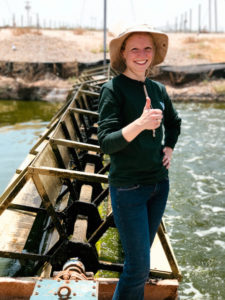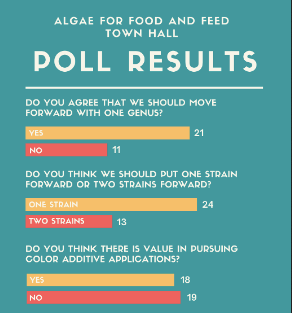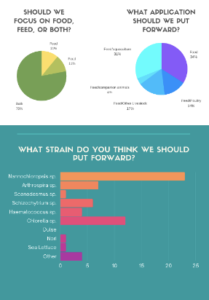The year 2020 will go down in history as one of historic turbulence. We share in the heartbreak of the COVID-19 pandemic and economic challenges for businesses large and small. Through it all, however, the community of the Algae Biomass Organization did find ways to keep up the momentum in scientific advances, commercial milestones, and important policy support for algae.
Take a look at what we’ve accomplished in the past 12 months.
We welcomed a new executive director:

ABO welcomed industry veteran Dr. Rebecca White as our new executive director. A leader in both science and commercialization, Rebecca comes as a new wave of algae awareness and investment is putting this industry at an inflection point.
We are seeing major advances and record funding in algae research, new commercial production facilities coming online, and innovative algae products are making waves in a range of new markets. Major media outlets like CNN, New York Times, CNBC, and Forbes are taking notice, all highlighting the exciting products and research from an industry turning algae into global game changer.
We achieved unprecedented policy support:
Our remarkable technological and commercial progress has helped build support for algae across the country. ABO is grateful for the strong bipartisan support we see in Congress, the dedicated staff at agencies such as the DOE and USDA, well as our members that are committed to working together as we build this industry.
Our collective effort has resulted in record-breaking policy support, including:
- $70 million for algae industry research, development, and demonstration in 2020 Congressional appropriations for DOE’s Bioenergy Technology Office, Office of Fossil Energy, and Office of Science.
- $110 million has been proposed in the US House of Representatives for algae industry research, development, and demonstration for 2021.
- ABO’s participation in a series of engagements with the federal Inter Agency Algae Working Group to align algae R&D efforts across multiple federal agencies.
- Coordination with the US Department of Agriculture to advance algae achievements in the 2018 Farm Bill and to develop the Algae Center of Excellence.
- Our members’ key roles in the pre-publication review of the Biomass Research and Development (BR&D) Board’s landmark Federal Activities Report on the Bioeconomy: Algae, which summarizes the bioeconomy initiative activities for the algae stakeholder community.
We proposed an Algae Center of Excellence to strengthen research and commercialization efforts:
 New products from algae and new technologies will not succeed without improved coordination among industry, academia and government. To that end, ABO furthered our work on our Algae for Food and Feed Initiative by putting together a proposal for the Algae Center of Excellence (ACE).
New products from algae and new technologies will not succeed without improved coordination among industry, academia and government. To that end, ABO furthered our work on our Algae for Food and Feed Initiative by putting together a proposal for the Algae Center of Excellence (ACE).
The mission of the ACE is to support the development, scale up and commercialization of innovative, sustainable and eco-restorative solutions for the production of food, feed, and bioproducts from algae. Fundraising is underway to establish the ACE with a goal to launch in 2021.
We launched the Macroalgae Working Group:
ABO is committed to advancing a spectrum of algae-based biotechnologies: microalgae, seaweeds and cyanobacteria. This year we began coordinating with leaders in the seaweed and kelp sectors on creating industry standards and trade practices that maximize sustainability as well as economic impacts.
Over 70 participants from around the globe formed our Macroalgae Working Group, including representatives from companies, universities, existing collaborative efforts, government agencies and NGOs. This is going to be an exciting area of work for 2021!
We made the Algae Biomass Summit a virtual experience, and brought together a global community like never before:
 We transitioned our annual Algae Biomass Summit to a fully online event in 2020 due to COVID19. Along the way, we discovered the virtual format allowed for exciting collaborations with an even larger audience than last year.
We transitioned our annual Algae Biomass Summit to a fully online event in 2020 due to COVID19. Along the way, we discovered the virtual format allowed for exciting collaborations with an even larger audience than last year.
Elected officials, sustainability advocates, CEOs, business development executives, scientific leaders, students and government agency staff from more than 30 countries all gathered over the course of several weeks to share the latest developments and plan for the future.
We expanded our partnership with the European Algae Biomass Association (EABA):
Global coordination will be a larger priority for this industry. In that light, ABO and EABA agreed to renew their partnership that extends the member benefits of each organization. As the leading algae trade associations for the US and Europe, ABO and EABA will be recognized as a Supporting Organization for each other. The two organizations have also agreed to collaborate to further develop the algae industry and associated technologies in the U.S., Europe, and globally through events, conferences, policy advocacy, and other efforts.
Most importantly, members of each organization can register for the other’s events, conferences and meetings at the member-only rates.
We are ready for 2021:
Despite a world unsettled by the events of 2020, ABO is well-positioned to expand the algae opportunity.
We invite your involvement. Like any trade association, this important work is supported by member dues, so please be sure to renew for 2021 if you are already an ABO member.
If you are not a member, please reach out today and we will welcome you into our community. We see exciting developments on the horizon.
See you in 2021!






 Following the Algae Food and Feed Meeting at the Algae Biomass Summit, the Algae for Food and Feed executive committee hosted a Town Hall on October 14, 2020. The Town Hall was a direct follow up to the discussion on regulatory initiatives at the Summit meeting, and the purpose was to get feedback on how many and what type of strains the Algae for Food and Feed initiative should move forward with for regulatory approval work. We are excited to share the results from the Town Hall with you as well as our next steps in seeking GRAS approval.
Following the Algae Food and Feed Meeting at the Algae Biomass Summit, the Algae for Food and Feed executive committee hosted a Town Hall on October 14, 2020. The Town Hall was a direct follow up to the discussion on regulatory initiatives at the Summit meeting, and the purpose was to get feedback on how many and what type of strains the Algae for Food and Feed initiative should move forward with for regulatory approval work. We are excited to share the results from the Town Hall with you as well as our next steps in seeking GRAS approval.